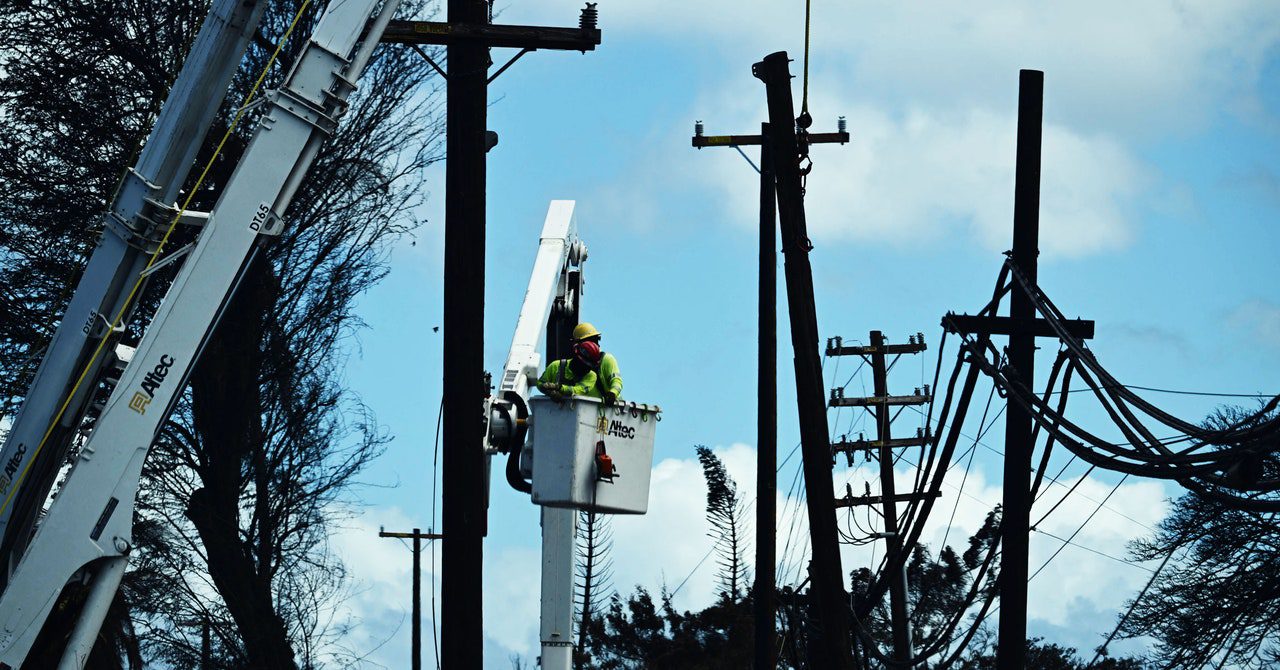No longer lengthy after the deadliest wildfire in trendy American historical past swept thru Lahaina, Maui, on August 8, hypothesis started swirling a few infamous igniter of out-of-control blazes: electric apparatus.
Even supposing investigators have not begun to formally decide the reason for the wildfire, witnesses reported energy poles snapping within the 60-mile-an-hour winds that had been pouring down the within sight mountains, showering dried plants in sparks. And remaining week, the County of Maui hit Hawaiian Electrical with a lawsuit, accusing the application of neglecting its responsibility to energy down its infrastructure, given the identified possibility of such prime winds sparking wildfires.
On Sunday, the application answered with a press free up, pronouncing that at 6:30 am, a morning fireplace “seems to were brought about via energy traces that fell in prime winds.” Firefighters extinguished that blaze, the clicking free up continues, however any other fireplace popped up in the similar space at about 3 pm, when the application says its traces were de-energized for greater than six hours. That fireside then unfold into Lahaina.
“Hawaiian Electrical has now admitted to beginning the Lahaina Fireplace on August eighth,” mentioned John Fiske, the suggest representing the County of Maui, in a observation supplied to WIRED. “In its fresh free up, issued Sunday night time ahead of the markets opened, Hawaiian Electrical seems to have steered there generally is a imaginable 2nd ignition supply within the afternoon of August eighth with out offering any supporting data.”
Investigators have not begun to decide if there have been two separate ignitions, or if the afternoon fireplace was once a flare-up of the only previous within the morning. Hawaiian Electrical declined to respond to questions for this tale, referring WIRED to its press free up.
If investigators in the end conclude that the fireplace’s purpose was once electric apparatus, the Maui fireplace will sign up for different fresh city-razing blazes within the American West that had been began—after which powered—via fierce winds damn the ability infrastructure. However even if utilities are in a position to stop their apparatus from sparking blazes—like via “undergrounding” traces, which means enclosing them in piping and burying them in trenches—there are many alternative ways to start out an epic conflagration on a warming planet.
Wind is very important to whipping up the largest, quickest, deadliest wildfires. And electrical energy generally is a unhealthy add-on: If gusts down timber into energy traces, or application poles snap or fall over, all that jostling can ship sparks into the plants beneath. Winds fan the rising flames, riding the blaze around the panorama with such velocity that individuals in the way in which don’t have time to evacuate. (Robust winds additionally loft embers into the air, and will raise them most likely 2 miles forward of the primary fireplace, growing new fires and making it more difficult for firefighters to control.) Cities like Lahaina within the “wildland-urban interface,” the place unkempt plants butts up towards constructions or intermingles with them, are particularly at risk of such fast-moving fires.
The us’s getting old grid wasn’t designed for these days’s local weather, with its hotter environment, intense, longer-lasting droughts, and more and more dry landscapes. So electrical-sparked, wind-driven fires are rising extra harmful and fatal. In 2017 the Tubbs Fireplace destroyed over 5,600 constructions and killed 22, and in 2018 the Camp Fireplace destroyed town of Paradise and killed 85. In 2019, the California application Pacific Gasoline and Electrical, or PG&E, reached a $13.5 billion agreement for wildfires connected to its apparatus, together with either one of those fires. Each have now been eclipsed via the Lahaina fireplace on the subject of the human price: A minimum of 115 other people were showed lifeless, with loads nonetheless lacking.





 #shorts #shortsfeed #nature #youtubeshorts #iciness
#shorts #shortsfeed #nature #youtubeshorts #iciness